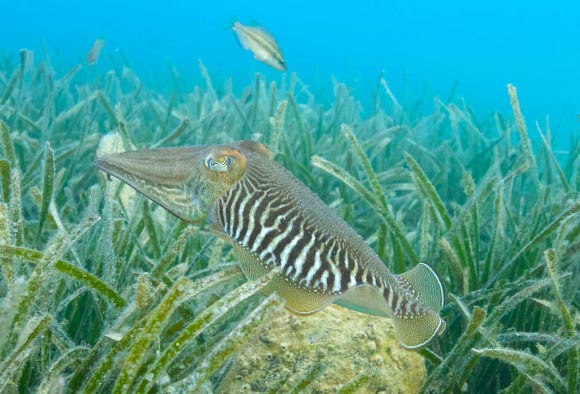New research led by the University of Cambridge and the Marine Biological Laboratory demonstrates that common cuttlefish (Sepia officinalis) can tolerate delays to obtain food of higher quality.
The common cuttlefish is a cephalopod native to the Mediterranean Sea, North Sea, and Baltic Sea.
Also known as the European common cuttlefish, it grows up to 0.5 m in length and 4 kg in weight.
It can rapidly alter both the color and pattern of its skin, helping it blend in with its surroundings and avoid predators. It uses pigmented, neurally controlled chromatophore organs to change its appearance in response to visual clues.
Dr. Alexandra Schnell, first author of the study and a researcher in the Department of Psychology at the University of Cambridge, and colleagues aimed to investigate self-control and learning performance in this marine creature, which is thought to have evolved under partially different pressures to previously studied vertebrates.
“We used an adapted version of the Stanford marshmallow test, where children were given a choice of taking an immediate reward (1 marshmallow) or waiting to earn a delayed but better reward (2 marshmallows),” Dr. Schnell said.
In the experiment, six cuttlefish in tanks were presented with two foods they commonly eat, each in a separate Perspex chamber.
In one chamber was a piece of king prawn, which they could eat immediately. In the other was a live grass shrimp, their preferred food, but they could only have the shrimp if they waited and didn’t eat the prawn.
A range of delays were tested, starting at 10 seconds and increasing by 10 seconds each time.
All six cuttlefish showed self-control, waiting for the grass shrimp and ignoring the king prawn.
Those with the most self-control could wait 130 seconds for the grass shrimp to be released — an ability comparable with large-brained animals like chimpanzees.
“It was quite astonishing that the cuttlefish could wait for over two minutes for a better snack,” Dr. Schnell said.
“Why would a fast-growing animal with an average life-span of less than two years be a picky eater?”
The learning ability of each cuttlefish was then tested in a different task.
A dark gray marker and a white marker were placed in random positions in the tank.
After learning to associate one color with a reward, the reward was switched to be associated with the other colour.
The cuttlefish that were both quicker to learn the association and quicker to realise the switch were the same ones showing more self-control in the first task.
“We found that cuttlefish with better learning performance — an indicator of intelligence — also showed better self-control,” Dr. Schnell said.
“This link exists in humans and chimpanzees, but this is the first time it has been shown in a non-primate species.”
The researchers suggest that self-control in cuttlefish is the by-product of another behavior: staying camouflaged on the sea bed for long periods of time to avoid predators. These periods are punctuated by brief foraging bouts in the open.
Self-control may help the cuttlefish optimise their foraging by only striking prey of better quality.
“The ability to exert self-control is an important element of the ability to plan for the future, which is quite a sophisticated behavior,” said co-senior author Professor Nicola Clayton, also from the Department of Psychology at the University of Cambridge.
“Self-control requires an understanding that ‘less is sometimes more’ — that avoiding temptation now might lead to a better future outcome.”
“This is a critically important building block for the evolution of complex decision-making.”
The results were published in the Proceedings of the Royal Society B.
_____
Alexandra K. Schnell et al. 2021. Cuttlefish exert self-control in a delay of gratification task. Proc. R. Soc. B 288 (1946): 20203161; doi: 10.1098/rspb.2020.3161








